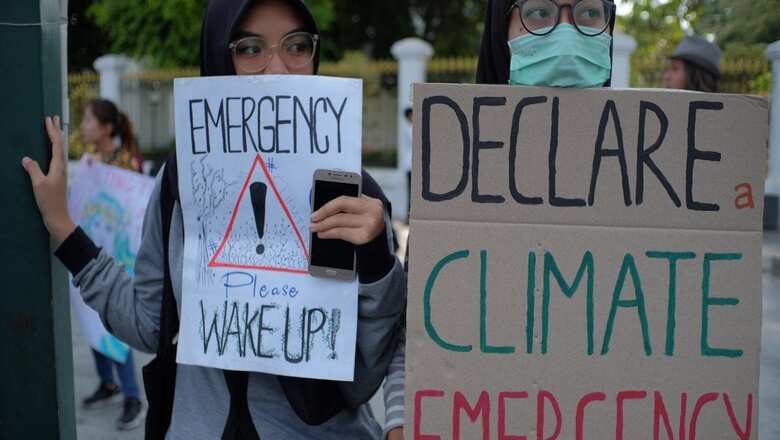
views
The world is on fire and July 2023 has set an alarming precedent — the hottest month ever recorded in human history, and potentially the hottest in 120,000 years — sending an unequivocal signal that immediate and drastic global climate action is not just necessary, but an existential imperative. The planet is heating up at an alarming pace, and the consequences are already devastating.
Asia, a region both vibrant and diverse, faces the brunt of the climate crisis. It is not just a major contributor to global greenhouse gas emissions, accounting for over 50 percent of the world’s total, but also houses 13 of the 30 countries most susceptible to climate change impacts. As the recent Climate Central report reveals, over 6.5 billion people across the globe experienced high temperatures, at least three times more likely, due to human-caused climate change in the month of July this year. This alarming reality demands urgent action at both the policy and individual levels.
The evidence of global warming is undeniable, and UN Secretary-General António Guterres has aptly stated that “the era of global warming has ended and the era of global boiling has arrived.” The time for rhetoric has passed, and the consequences of inaction are dire. Guterres’s call for “dramatic, immediate climate action” holds true for Asia, where the impact of climate change is already felt in extreme weather events, heat waves, and rising sea levels.
In this critical fight, however, there is a growing lack of consensus among nations. While scientific evidence overwhelmingly supports the urgent need for collective action, political divisions often hinder progress.
Sample these. In July 2023, which was the hottest July ever on earth, the G20 leadership participated in Energy Transitions Ministerial meeting in Goa, to address the climate crisis. However, the outcome of the meeting highlighted the stark absence of global consensus. Russia and China’s objections led to a failure to reach a joint communique, underscoring the immense challenge of rallying nations together to decarbonize.
It may be noted that the G20, responsible for over three-quarters of global emissions and gross domestic product, holds immense potential to spearhead the global fight against climate change. Yet, the lack of agreement on phasing down fossil fuels, critical to curbing emissions, reflects the disunity in tackling this existential threat.
Earlier, the United Nations Climate Conference, COP27, held in Egypt last year, also faced considerable disagreements among nations, emphasizing the lack of global consensus. Key issues like the establishment of a loss and damage fund and integration of human rights in climate actions sparked divisions among participating countries. Moreover, the failure to decisively address the urgent need to transition away from fossil fuels underscored the ongoing challenge of reaching a global consensus on this crucial aspect of climate action.
So, while world leaders acknowledge the scientific evidence, there remains frustrating inertia when it comes to implementing concrete measures. The consequences of inaction are evident in the lives lost, ecosystems destroyed, and livelihoods shattered by extreme weather events. The time for rhetoric and incremental actions is over. The urgency of the climate crisis demands a united and decisive response. This lack of consensus is a wake-up call for all stakeholders, from governments to corporations and individuals.
John Kerry, the US Special Presidential Envoy for Climate, visited India in July to foster collaboration on climate action and clean energy initiatives. His decision to visit India reinforces the importance of global partnerships in confronting the climate crisis and reminds the world that the future of humanity hinges on collective action.
Moving further, the upcoming COP28 climate summit in Dubai presents a crucial opportunity for Asia’s major polluters to unite and embrace tougher targets to break free from fossil fuel dependency. Policymakers must prioritize global interests over short-term gains and commit to decarbonization with utmost resolve.
At the same time, individual action is equally vital in the fight against climate change. As governments and industries work to implement climate-friendly policies and invest in renewable energy, every individual can contribute to this global effort. Energy conservation, waste reduction, and supporting eco-conscious initiatives are simple yet impactful steps that everyone can take.
Fiscal policy can play a significant role in driving climate action in Asia, but that is not enough. Governments must prioritise investments in renewable energy, sustainable infrastructure, and green technologies, steering the region towards a resilient and sustainable future.
The urgency for climate action in Asia cannot be overstated. Collaboration among nations is essential to confront this existential crisis, and developed nations must support vulnerable countries in their quest for resilience and adaptation. The challenge may be enormous, but the potential for transformation is equally significant.
As the era of global boiling unfolds, Asia faces an unparalleled opportunity to lead the charge against climate change. The choice lies before us — a united global front or a fractured world grappling with the consequences. Together, we can shape a sustainable and prosperous future for Asia and the world, where the scorching reality of climate change is met with strength, resolve, and collective action.
The author is with Climate Trends, a research-based consulting and capacity-building initiative that aims to bring greater focus on issues of environment, climate change and sustainable development. Views expressed in the above piece are personal and solely that of the author. They do not necessarily reflect News18’s views.




















Comments
0 comment